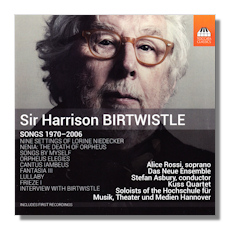
The Internet's Premier Classical Music Source
Related Links
-
Birtwistle Reviews
- Latest Reviews
- More Reviews
-
By Composer
-
Collections
DVD & Blu-ray
Books
Concert Reviews
Articles/Interviews
Software
Audio
Search Amazon
Recommended Links
Site News
 CD Review
CD Review
Harrison Birtwistle

Songs 1950-2006
- Nenia: The Death of Orpheus 3,7
- Orpheus Élégies for Countertenor, Oboe & Harp 4
- Fantasia III 6
- Nine Settings of Lorine Niedecker 1,5
- Frieze I 6
- Lullaby 1,2
- Songs By Myself 3,7
- Cantus Iambeus 7
1 Sophia Körber, soprano
2 Sarah Lewark, soprano
3 Alice Rossi, soprano
4 Johannes Euler, countertenor
4 Doga Sacilik, oboe
4 Jasmin-Isabel Kühne, harp
5 Aram Yagubian, cello
6 Kuss Quartet
7 Das Neue Ensemble/Stefan Asbury
Sir Harrison Birtwistle
Stephan Meier, (interviewer and) director
Toccata Classics TOCC0281
Important though the voice is to British composer Harrison Birtwistle (b. 1934), his actual songs have been somewhat neglected. Indeed only the Orpheus Élégies, Nine Settings of Lorine Niedecker and Lullaby from the items available on the present CD have other recorded performances. This excellent selection collects eight works together which span almost half Birtwistle's life (Nenia dates from 1970, Lullaby from 2006). It also offers compelling accounts of the works and illustrates the ways in which Birtwistle has tended to use instruments vocally and the voice as an instrument. It's a blend of almost neoclassical penetration and impersonal abstraction that all these performers clearly understand well.
It is perhaps sparseness, crystalline clarity, which will strike you first. None of the players or singers rushes to "present" the music – although the energy exuded in Cantus Iambeus is almost tangible. All the performers' own fresh focus and sense of purpose are allowed to convey the music's own meaning, not any kind of push. Soprano Sophia Körber and cellist Aram Yagubian in the Lorine Niedecker settings epitomize this concentration. Their tempi are measured and varied; their dynamics range from barely audible to very lively. After the Orpheus Élégies this is the longest work on the CD. Both sets are articulated – the latter by countertenor, Johannes Euler, with Doga Sacilik (oboe) and Jasmin-Isabel Kühne (harp) – with a closeness and projection that respect Birtwistle's ability to offer the profound and the fundamental in a chamber context.
Indeed, the Kuss Quartet seems to sum up Birtwistle's intensity and drive in the short Fantasia III and Frieze I. They're extracted from the "Nine Movements for String Quartet", written between 1991 and 1996. Rhythmical and heavy with punctuation, each typifies the above-mentioned overlap between the vocal and the instrumental, use of the hocket – sometimes quite obliquely – being the best example.
The singing of Italian soprano, Alice Rossi, exposes another aspect of this collection from Toccata Classics, the sister company of Toccata Press, independent publisher of books on music: variety. Rossi's seems a more engaged, deliberately connected, approach to articulating the texts – in both Nenia: The Death of Orpheus and Songs By Myself – yet it has no feeling of oppressiveness. Although the players in these pieces bring urgency, it's an appropriate urgency.
Lullaby is sung here by the two sopranos, Sophia Körber and Sarah Lewark. It takes us to a different world; although sleep is a recurring theme, both as metaphor and literally, in Birtwistle's work. Lastly, the difference between Cantus Iambeus from 2004 and the similarly-scored Carmen Arcadiae from the late 1970s in textures says a lot about how far Birtwistle has come. The performers observe the assurance with which the composer approaches the theme. Das Neue Ensemble under Stefan Asbury gives an exemplary account.
The very short interview with Birtwistle is illuminating: he emphasizes how personal is song-writing for him; in particular his songs are a reflection of (his) melancholy. He cites the topos of Dowland's (self-conscious) dolefulness. Birtwistle suggests that one key aspect of songwriting is the projection of the composer's and poet's own emotions into and onto the musical artefact. One is perhaps less aware of sorrow in these performances than of energy. Or maybe the two aren't mutually exclusive – particularly in the context of vocal music.
The acoustics of the two locations used for these live recordings are responsive; they allow the characteristics of both voices and instruments to emerge naturally yet pointedly, with clarity. The booklet – although not completely proofed – introduces us to Birtwistle's work in the area of song, reproduces the texts in German and English, and contains brief bios of some of the performers as well as the text of the interview with Stephan Meier (who wrote the notes here, but doesn't actually speak) and the composer [tr.27]. If Birtwistle's music is of any interest to you, or if you are an avid collector and want to explore these lesser-known corners of his output, this CD will not disappoint.
Copyright © 2015, Mark Sealey





















